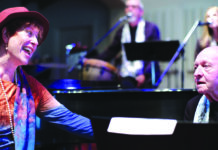On Saturday, Sept. 24, the Culver City Bicycle Coalition will join with Transition Culver City and other groups to organize an “Alternative Transportation Parade” in support of 350.org’s “Moving Planet” international day of action. The grassroots environmental organization is intently focused on climate change. What does this have to do with bikes and Culver City?
First, a word about climate change, which will likely present the single biggest challenge to human (and non-human) well-being in the 21st century and will be a risk multiplier, exacerbating many of the other challenges that trouble us, like poverty, disease and war. Despite ongoing squabbles in op-ed pages and political rallies, there is no longer any real scientific debate about the reality of climate change and the human factors behind it and there hasn’t been for many years. A brief example illustrates the problem with the supposed “uncertainty” of climate change.
The Memorial Sloan-Kettering Cancer Center offers an online tool that gives a statistical assessment of one’s risk of lung cancer based on the length of time spent smoking and the amount smoked. Perhaps surprisingly, a person who smokes 20 cigarettes a day from the time she is 15 until she turns 65, and then continues to smoke until 75 has only a 10% chance of developing lung cancer between 65 and 75 – a mere 10%. Of course, that’s an order of magnitude greater risk than a non-smoker and this statistical significance is the reason we have no problem at all stating that it is a fact that cigarettes cause lung cancer. Note, however, that the confidences associated with the central claims about the anthropogenic drivers behind climate change are much, much higher than 10% — they’re on the order of 95-98%, according to the Intergovernmental Panel on Climate Change and other scientific assessment groups. Yet, somehow, a number of people seize on that 2% and say, “Ah-ha! It’s not certain!” Perhaps less surprisingly, many of the architects of climate change denial are, quite literally, the same people who once orchestrated the campaign to obfuscate the facts linking cigarettes to lung cancer.
Although climate change will hit the developing world first and hardest, we’re not immune to its effects here in Culver City. As a warmer planet holds more water vapor in the atmosphere, we can expect more extreme weather events – both heavy rains and harsher droughts. Much of the water here in Southern California is captured in the vast reservoir of the Sierra snowpack. However, when that snowpack is threatened by either reduced precipitation or earlier melting of normal precipitation, we’ll suffer from water shortages, which will be exacerbated by our growing population. And that means more than brown lawns. The agricultural breadbasket of the Central Valley is also dependent on the Sierra snowpack.
One of the major things we can do to help combat climate change is to change the way we move around (the other is to change the way we vote and to make sure our politicians take climate change seriously). Here in Culver City, we are uniquely positioned to become a hub for alternative, non-carbon or low-carbon transportation and a destination for Californians interested in getting out without “mini-Carmageddon” that accompanies driving in Los Angeles.
Culver City is blessed with the Ballona Creek Bicycle Path, the soon-to-be-operational Metro Rail station and a downtown business corridor that is bicycle- and pedestrian-friendly. Residents of our city can easily bike to movie theaters, restaurants, art galleries, parks, coffee houses, pubs, the Plunge, the library, school and their neighbors’ homes. In doing so, they can avoid traffic and parking fees while enjoying exercise, our enviable weather and closer contact with their community. All we need to do is make people aware of how easy it is to bike around our city and to continue to improve the infrastructure for doing so.
The Alternative Transportation Parade on Sept. 24 is an opportunity to celebrate our community and its amazing accessibility for bicycles and pedestrians. We plan on meeting at 1 p.m. by the “dancing lion” fountain by the historic Culver Hotel before leading the parade along the newly established downtown connector to the Metro Rail station. Come join us and discover, or be reminded of, our exceptional community and the ease with which we can leave the car at home.
Brian Treanor is an associate professor of Philosophy and the director of Environmental Studies at Loyola Marymount University in Los Angeles. He received his Ph.D. from Boston College. His teaching and research cover a wide range of issues but tend to focus on the fields of hermeneutics, environmental philosophy, continental philosophy, theology and ethics. An active member of the Culver City Bicycle Coalition, he lives and bikes in Culver City.
Bike Safe, Bike Smart! is a weekly column to promote responsible cycling by providing information, education and advice about riding. It’s written by members of the Culver City Bicycle Coalition (CCBC), a local chapter of the Los Angeles County Bicycle Coalition. The CCBC hosts a family ride each month. For more information, go to ccbike.org.













